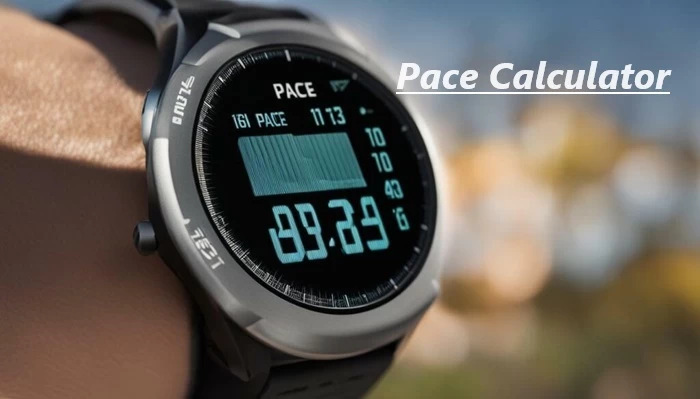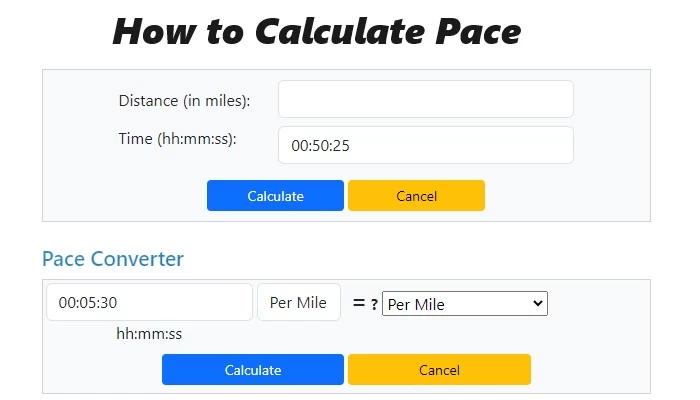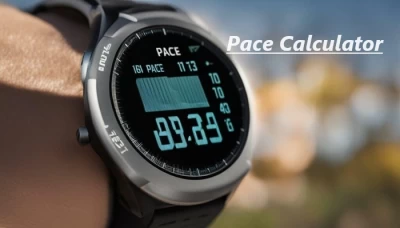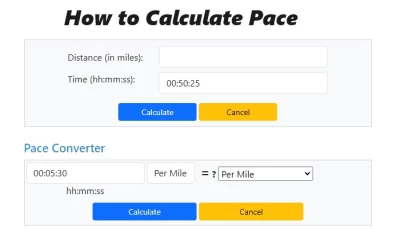Calculate Your Stride Through Life's Paces
Pace is more than just a number; it's a reflection of your speed and efficiency during physical activities.

Greeting fitness enthusiasts and health-conscious individuals. We shall set on a journey to unravel the secrets of a tiny yet mighty metric that plays a crucial role in our pursuit of a healthier lifestyle - pace. Whether you're an aspiring athlete or someone striving for a more active and fit life, understanding and measuring your pace can be a game changer. Let's explore the world of peace, exploring what it is, why it matters, and how it can transform your fitness journey.
What is Pace?
Pace is more than just a number; it's a reflection of your speed and efficiency during physical activities. But, pace measures the time it takes to cover a certain distance, often expressed as minutes per mile or kilometers. For example, a pace of 8 minutes per mile means it takes 8 minutes to run one mile.
We offer an online pace calculator that helps you calculate your pace, along with a handy pace converter. Whether you're a runner trying to figure out your speed or someone looking to convert your pace from minutes per mile to kilometers per hour, our calculators make it easy for you to get the information you need. Just plug in your data and let our tools do the work for you, ensuring a seamless experience in managing your pace-related calculations.
Why Measure Pace?
- Benchmarking Progress
Monitoring your pace provides a tangible way to track your progress. Whether you're a seasoned runner aiming for a faster time or a beginner gradually building endurance, understanding your pace allows you to set realistic goals and measure your improvement over time.
- Efficient Training
Pace is a valuable tool for tailoring your training regimen. By gauging your current pace, you can design workouts that challenge your limits without risking burnout or injury. This personalized approach helps you make the most of your time and energy during each session.
- Goal Setting
Setting fitness goals becomes more achievable with a clear understanding of your pace. Whether you aspire to complete a marathon, conquer a specific hiking trail, or enhance your daily walk, knowing your pace aids in establishing realistic milestones that keep you motivated on your fitness journey.
- Preventing Overexertion
Pace serves as a built-in safety mechanism. Pushing too hard without regard to your pace can lead to over-training and injuries. Monitoring your pace ensures that you stay within your body's capabilities, reducing the risk of burnout and setbacks.
How to Calculate Pace?
Now that we appreciate the significance of pace, let's demystify how to calculate it. The process is straightforward and can be applied to various activities, from running and cycling to walking.

Pace (minutes per mile or kilometer) = Time / Distance
- Athletes and Pace
For athletes, pace is a cornerstone in their training and performance. Whether you're a sprinter, a marathon runner, or an avid cyclist, understanding and optimizing your pace can make all the difference.
- Marathon Runners
Marathon training revolves around maintaining a sustainable pace over long distances. Knowing your pace helps you conserve energy and strategically plan when to push harder or ease off during a race.
- Sprinters
Sprinters focus on short bursts of maximum effort. Pace is crucial in refining the explosive power needed for sprinting. By measuring and improving their pace, sprinters can enhance their speed and performance on the track.
- Cyclists
Cyclists often aim for a consistent pace to endure lengthy rides. Measuring pace is vital for optimizing endurance, especially in events like time trials or long-distance cycling tours.
Everyday Fitness for the Common Man
Now, let's shift our focus to the everyday individual striving for a healthier lifestyle. Whether you're hitting the gym, walking in the park, or exploring a new hiking trail, pace plays a pivotal role in your fitness journey.
- Walking for Health
Walking is a fantastic low-impact exercise accessible to almost everyone. Measuring your walking pace can help you gradually increase your intensity, ensuring a steady progression in fitness without straining your body.
- Jogging and Running
For those venturing into jogging or running, pace is a crucial metric in preventing burnout. Starting with a comfortable pace and gradually pushing yourself helps build stamina and avoid unnecessary strain.
- Cycling for Recreation
Casual cyclists can also benefit from understanding their pace. It allows you to tailor your rides based on your fitness level, ensuring an enjoyable experience without pushing beyond your limits.

Greeting fitness enthusiasts and health-conscious individuals. We shall set on a journey to unravel the secrets of a tiny yet mighty metric that plays a crucial role in our pursuit of a healthier lifestyle - pace. Whether you're an aspiring athlete or someone striving for a more active and fit life, understanding and measuring your pace can be a game changer. Let's explore the world of peace, exploring what it is, why it matters, and how it can transform your fitness journey.
What is Pace?
Pace is more than just a number; it's a reflection of your speed and efficiency during physical activities. But, pace measures the time it takes to cover a certain distance, often expressed as minutes per mile or kilometers. For example, a pace of 8 minutes per mile means it takes 8 minutes to run one mile.
We offer an online pace calculator that helps you calculate your pace, along with a handy pace converter. Whether you're a runner trying to figure out your speed or someone looking to convert your pace from minutes per mile to kilometers per hour, our calculators make it easy for you to get the information you need. Just plug in your data and let our tools do the work for you, ensuring a seamless experience in managing your pace-related calculations.
Why Measure Pace?
- Benchmarking Progress
Monitoring your pace provides a tangible way to track your progress. Whether you're a seasoned runner aiming for a faster time or a beginner gradually building endurance, understanding your pace allows you to set realistic goals and measure your improvement over time.
- Efficient Training
Pace is a valuable tool for tailoring your training regimen. By gauging your current pace, you can design workouts that challenge your limits without risking burnout or injury. This personalized approach helps you make the most of your time and energy during each session.
- Goal Setting
Setting fitness goals becomes more achievable with a clear understanding of your pace. Whether you aspire to complete a marathon, conquer a specific hiking trail, or enhance your daily walk, knowing your pace aids in establishing realistic milestones that keep you motivated on your fitness journey.
- Preventing Overexertion
Pace serves as a built-in safety mechanism. Pushing too hard without regard to your pace can lead to over-training and injuries. Monitoring your pace ensures that you stay within your body's capabilities, reducing the risk of burnout and setbacks.
How to Calculate Pace?
Now that we appreciate the significance of pace, let's demystify how to calculate it. The process is straightforward and can be applied to various activities, from running and cycling to walking.

Pace (minutes per mile or kilometer) = Time / Distance
- Athletes and Pace
For athletes, pace is a cornerstone in their training and performance. Whether you're a sprinter, a marathon runner, or an avid cyclist, understanding and optimizing your pace can make all the difference.
- Marathon Runners
Marathon training revolves around maintaining a sustainable pace over long distances. Knowing your pace helps you conserve energy and strategically plan when to push harder or ease off during a race.
- Sprinters
Sprinters focus on short bursts of maximum effort. Pace is crucial in refining the explosive power needed for sprinting. By measuring and improving their pace, sprinters can enhance their speed and performance on the track.
- Cyclists
Cyclists often aim for a consistent pace to endure lengthy rides. Measuring pace is vital for optimizing endurance, especially in events like time trials or long-distance cycling tours.
Everyday Fitness for the Common Man
Now, let's shift our focus to the everyday individual striving for a healthier lifestyle. Whether you're hitting the gym, walking in the park, or exploring a new hiking trail, pace plays a pivotal role in your fitness journey.
- Walking for Health
Walking is a fantastic low-impact exercise accessible to almost everyone. Measuring your walking pace can help you gradually increase your intensity, ensuring a steady progression in fitness without straining your body.
- Jogging and Running
For those venturing into jogging or running, pace is a crucial metric in preventing burnout. Starting with a comfortable pace and gradually pushing yourself helps build stamina and avoid unnecessary strain.
- Cycling for Recreation
Casual cyclists can also benefit from understanding their pace. It allows you to tailor your rides based on your fitness level, ensuring an enjoyable experience without pushing beyond your limits.
Conversation
Latest Blogs
© Blog CoolCalculator, Explore CoolCalculator, your destination for the latest insights, tips, and updates on the world of online calculators. Stay informed and make your calculations smarter with our blog. ,
Designed
by Saad Media Team , Team Lead M.Rizwan Akhtar












